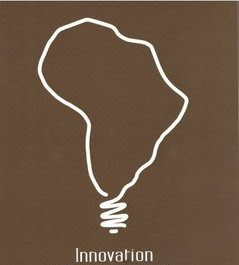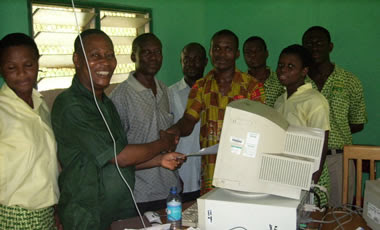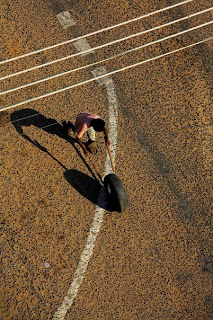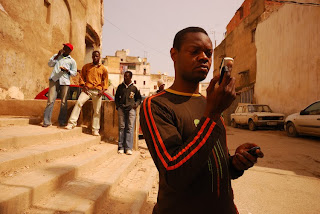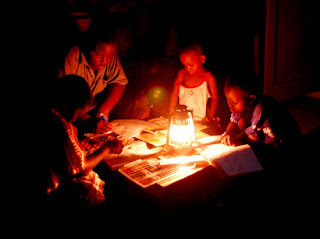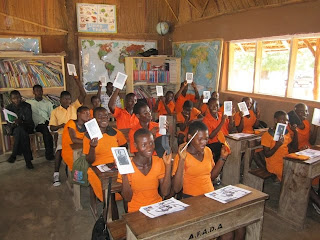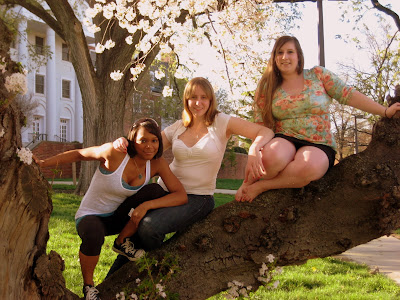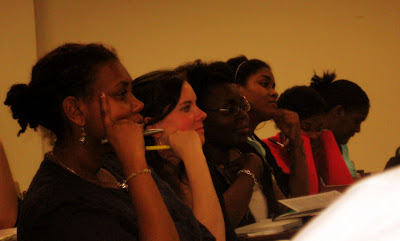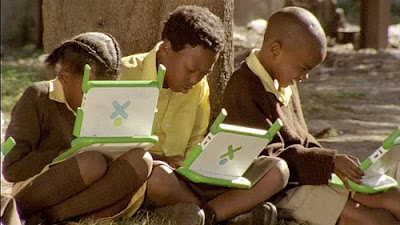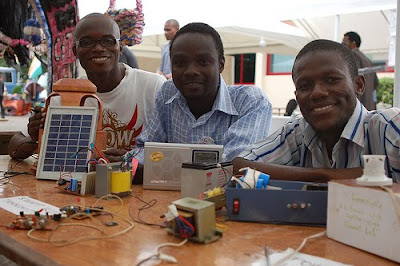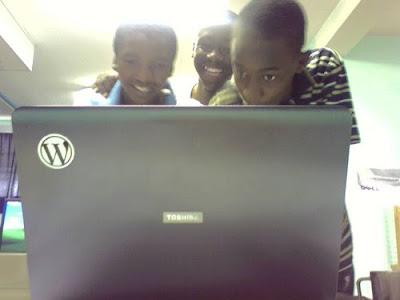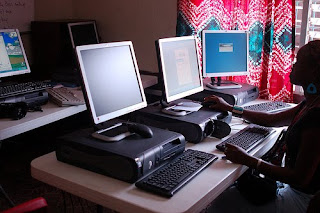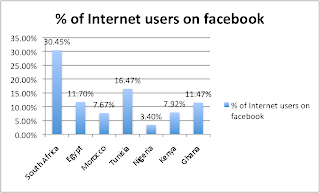This blog, which began as a class project, has changed my life. I am very appreciative of the readers and comments (on and offline). Since the end of May I have not posted anything new due to the heavy load of work and school I have had in the past months but I have decided to continue with it as I begin the new year.
As a class project, the focus was on bringing technological news in Ghana (and Africa) to the outsider so they could witness progress and unique tech applications on the continent. There were guidelines and requirements that I had to stick to in order to pass the class (I got a B). Well, thank heavens the class is over. I will now be able to add my own flavor to the blog and the posts will tend to be more opinionated. I welcome comments and discussion... and refer others to read as well!!!
Happy Holidays and Happy New Year!
Afehyia pa!!
Sunday, December 26, 2010
Saturday, May 8, 2010
Drawing the Semester to a Close: Reflections
As the semester draws to a close, I realize that creating and maintaining this blog has been a huge learning experience for me. It has taught me much more about myself and exposed me to so much information than I realized existed. When I chose my blog topic, it was my intention to shed light on where Ghana is in its technological adaptations and also to demonstrate how Africans in general always find unique ways of using technology to suit their unique needs. I gathered news information from different web sources such which are listed on the lower right of this blog page. I also got a lot of feed from twitter. The more African and international news sources I followed, the more headlines I was able to gather to report which helped me keep my blog content in high quality (in my opinion). I have gained a new appreciation for twitter because of this.
This class has been a very good learning experience. I am very glad that I took it. I have learned so much about trending technologies, how technology is changing the face of journalism and how the rate of adoption of new technology is reshaping everything from education to health to politics to fashion.
My favorite post would have to be the two posts regarding the use of Facebook by Africans and by Ghanaians. I think I loved this post the most because it was a compilation of research that I did myself. The statistics that I presented referring specifically to Ghana were gathered by my friend and me through a survey that I created. It confirmed one of the most important points presented throughout my blog. Mobile technology has penetrated Africa beyond grid electricity and land-line internet.
My least favorite post was that on the use of cell phones in the US which was a homework assignment for class. This is probably because the articles we had to read in order to respond to the topic involved a lot of data that was hard for me to synthesize.
I am ending with e-waste because I feel this is a topic that was not touched on in class. As an environmental science and technology major that grew up in Africa, this is a huge concern for me. A lot of emphasis in this class has been placed on what’s new and upcoming but no one has considered the effects of so much technology and hardware being produced. The only way to keep adopting new technology is to trash old ones, hence the big e-waste problem. Its killing the environment and causing poisoning to a lot of women and children in the developing world.
Overall, this has been an awesome experience. I do believe I will be blogging in the future.
This class has been a very good learning experience. I am very glad that I took it. I have learned so much about trending technologies, how technology is changing the face of journalism and how the rate of adoption of new technology is reshaping everything from education to health to politics to fashion.
My favorite post would have to be the two posts regarding the use of Facebook by Africans and by Ghanaians. I think I loved this post the most because it was a compilation of research that I did myself. The statistics that I presented referring specifically to Ghana were gathered by my friend and me through a survey that I created. It confirmed one of the most important points presented throughout my blog. Mobile technology has penetrated Africa beyond grid electricity and land-line internet.
My least favorite post was that on the use of cell phones in the US which was a homework assignment for class. This is probably because the articles we had to read in order to respond to the topic involved a lot of data that was hard for me to synthesize.
I am ending with e-waste because I feel this is a topic that was not touched on in class. As an environmental science and technology major that grew up in Africa, this is a huge concern for me. A lot of emphasis in this class has been placed on what’s new and upcoming but no one has considered the effects of so much technology and hardware being produced. The only way to keep adopting new technology is to trash old ones, hence the big e-waste problem. Its killing the environment and causing poisoning to a lot of women and children in the developing world.
Overall, this has been an awesome experience. I do believe I will be blogging in the future.
Recycling while bridging the global digital divide
In my previous post, I talked about electronic waste (e-waste) and how many developed countries are creating a new type of pollution in developing countries. This happens when old computers and other electronics are discarded or recycled but end up being shipped to landfills in developing countries instead of being handled in the regulated manner because it costs less to do so. Well, in this next story, we see how a company is making a difference in this trend.
Collecting and Recycling Ecologically (CARE): Computers for Developing Countries is a company based in the United Kingdom and operating in Ghana that takes redundant computers that British companies wish to discard and recycles them by donating them to schools and colleges in Ghana. This might sound like not such a big deal but here is where it makes a real difference. In the previous posting, the video showed how many of these discarded computers come as ‘donations’ and 50% of them don’t even work. This is what creates the waste because no one is going to repair these outdated computers so they get thrown away. And then the pollution gets out of hand when there is such an abundance of these that they are burned for their copper wire by scavengers and children releasing toxic fumes.
CARE removes this danger by assessing every computer that goes through their system. Computers and computer equipment is collected from businesses, schools and individuals for a small fee. All data on the equipment is then wiped clean to Ministry of Defense standards. It is after this that the computers are shipped to Ghana for distribution. They are taken to service centers that are responsible to installing new programs as well as training IT specialists to maintain the PC systems once installation is complete at the schools. After the donations, the students and teachers are also trained to use and maintain computers. Their program enables schools in Ghana and the UK learn from each other as they collaborate through the internet. They are working towards projects that will forge international projects and relationships.
But there is yet another component of this company that does even more to combat pollution in Ghana. There is an increasing plastic waste problem that exists in the country. Almost everything that is sold in Ghana is vended in plastic bags, including water. Water is sold on city streets in plastic packets instead of bottles. These plastic packets and black plastic bags used to hold everything have been accumulating on trash dumps and on the streets since they aren’t biodegradable. Currently, there is no national waste management system in the country. The bags also clog the drainage systems causing floods during the heavy rain season. For this reason, an ‘Eco-Code’ has been drafted by CARE to be signed by all students of schools that receive computers donations. This code requires them to put measures in place to curb this pollution.
I look forward to seeing how CARE will change the face of pollution and recycling in Africa and the e-waste menace.
Labels:
E-waste,
Ghana,
recycling,
technology gap
Tuesday, April 27, 2010
Digital Dumping: the latest environmental crime
Ever wondered what happened to your old televisions, radios, computer monitors and systems when you threw them away and upgraded? I’m sure some of you might have donated them to charity, others might have ‘recycled’ them with electronic companies, and then some of you just threw them in the dumpster (admit it). Well, I have news for you. They all end up in the same place regardless of how you got rid of it.
It is becoming big business to ship outmoded electrical overseas to poorer countries instead of recycling them with environmentally safe methods. Some of these countries have no idea that they are getting ‘trash.’ They are told that they are ‘donations’ only to find out that half of them don’t even work. The non-functional goods are then dumped on sites that have turned into mountains. This sort of pollution would never be entertained in America. But America is causing it elsewhere. And as these heaps of e-waste grow, the poor begin to scavenge through the rubble is search of anything valuable. Boys and women, even children have created an occupation out of searching through e-waste trash heaps for valuable copper wire and other spare parts that could be sold for money. In order to be able to extract these wires and parts, they burn the plastics coverings of the monitors and tvs to expedite the process. The fumes emitted are toxic and are a slow poisoning to these ignorant victims of the irresponsibility shown by the developed world.
The video below, presented by Frontline on PBS, gives detailed coverage of the process, first visiting the Korle Lagoon in Ghana and then tracking a container of supposedly recycled e-waste all the way to Hong Kong. The Korle Lagoon was once a wetland that helped maintain the natural balance of the environment in and around Ghana’s capital, Accra. Now it has been named one of the most polluted water bodies in the world. Even the locals call it Sodom and Gomorrah: a dumping site for the trash that the West has conveniently forgotten about.
The fight against the dumping of e-waste is a global campaign that is finally beginning to attract the attention of the necessary decision-makers of developed countries. With all the conversation around the world about climate change and environmental preservation, hazards like this are no longer able to fly under the radar. I will bring more developments on the steps that NGO’s and governments are taking to clean up the mess that has been made.
It is becoming big business to ship outmoded electrical overseas to poorer countries instead of recycling them with environmentally safe methods. Some of these countries have no idea that they are getting ‘trash.’ They are told that they are ‘donations’ only to find out that half of them don’t even work. The non-functional goods are then dumped on sites that have turned into mountains. This sort of pollution would never be entertained in America. But America is causing it elsewhere. And as these heaps of e-waste grow, the poor begin to scavenge through the rubble is search of anything valuable. Boys and women, even children have created an occupation out of searching through e-waste trash heaps for valuable copper wire and other spare parts that could be sold for money. In order to be able to extract these wires and parts, they burn the plastics coverings of the monitors and tvs to expedite the process. The fumes emitted are toxic and are a slow poisoning to these ignorant victims of the irresponsibility shown by the developed world.
The video below, presented by Frontline on PBS, gives detailed coverage of the process, first visiting the Korle Lagoon in Ghana and then tracking a container of supposedly recycled e-waste all the way to Hong Kong. The Korle Lagoon was once a wetland that helped maintain the natural balance of the environment in and around Ghana’s capital, Accra. Now it has been named one of the most polluted water bodies in the world. Even the locals call it Sodom and Gomorrah: a dumping site for the trash that the West has conveniently forgotten about.
The fight against the dumping of e-waste is a global campaign that is finally beginning to attract the attention of the necessary decision-makers of developed countries. With all the conversation around the world about climate change and environmental preservation, hazards like this are no longer able to fly under the radar. I will bring more developments on the steps that NGO’s and governments are taking to clean up the mess that has been made.
E-WASTE: Re-Focusing of my blog
For the remainder of the semester we have been asked to refocus our blogs on one particular topic. Something that we believe has not been covered in class or something we would like to talk about that has to do with technology. I have decided that I will focus the remainder of my blogging on E-waste. This is a term given to the remains of electronics such as old televisions, radios and computers. At the moment, there exists no legislation in the United States to regulate how these items are discarded of. The EPA has made rules of its own that keep the US in check. But what about the rest of the world? I will focus my upcoming posts uncovering the situation not really here in the US but worldwide.
Monday, April 26, 2010
Photography in Ghana: rising to great heights
There are two Ghanaian photographers in Ghana that are breaking grounds in photography. They are Sefa Nkansah and Emmanuel Bobbie who goes by the name ‘Bob Pixel.’ These men have given a new twist to African photography and have a following that increases daily. It’s awesome to see the perspectives they put on life and watching their slideshows has become a habit of mine.
Here, a familiar image is given a new look. It’s common to see African women with babies strapped on their backs. But not all of them ride bicycles.
That right there is a woman on the move. She had a place to go and was determined to get there. I’m sure the baby enjoyed the ride too. She could have been on the bike all day running errands and decided to take a rest. Here, the photographer got his chance to capture the moment.
As kids, boys made toy cars with tin cans, rubber bands, twigs and other things. And sometimes, it was just a car tire and two sticks. Those were always the easiest and you could run fast with them.
Sefa Nkansah’s capture of this simple toy from a rooftop just blows my mind. Anyone who saw this picture commented that they would have never thought to take this from a rooftop. The color and the street and the shadow just makes you want to get a tire yourself and start running. It’s pretty brilliant.
But the most brilliant picture, in my opinion, happens to be this one here.
I’m the type of person that can sleep practically anywhere but I don’t think I’d manage this. He seems so comfortable taking his nap after a hard day’s work. The picture communicates so much. The lighting (or lack thereof), the position, the clarity and then the fact that it’s in black and white gives it a real professional touch. One of Bob Pixel’s best.
Good job guys on all of these photos.
And to add a footnote: these men are friends. They would, in normal circumstances, be rivals competing against each other but they rather comment and criticize each other's work positively and that is commendable of both of them.
Here, a familiar image is given a new look. It’s common to see African women with babies strapped on their backs. But not all of them ride bicycles.
That right there is a woman on the move. She had a place to go and was determined to get there. I’m sure the baby enjoyed the ride too. She could have been on the bike all day running errands and decided to take a rest. Here, the photographer got his chance to capture the moment.
As kids, boys made toy cars with tin cans, rubber bands, twigs and other things. And sometimes, it was just a car tire and two sticks. Those were always the easiest and you could run fast with them.
Sefa Nkansah’s capture of this simple toy from a rooftop just blows my mind. Anyone who saw this picture commented that they would have never thought to take this from a rooftop. The color and the street and the shadow just makes you want to get a tire yourself and start running. It’s pretty brilliant.
But the most brilliant picture, in my opinion, happens to be this one here.
I’m the type of person that can sleep practically anywhere but I don’t think I’d manage this. He seems so comfortable taking his nap after a hard day’s work. The picture communicates so much. The lighting (or lack thereof), the position, the clarity and then the fact that it’s in black and white gives it a real professional touch. One of Bob Pixel’s best.
Good job guys on all of these photos.
And to add a footnote: these men are friends. They would, in normal circumstances, be rivals competing against each other but they rather comment and criticize each other's work positively and that is commendable of both of them.
The Fastest Cell Phone Rumor
A week or so after the catastrophic earthquake in Haiti, a rumor spread in Ghana that there would be an earthquake. No one has been able to trace the source of the rumor but what was confirmed was the speed at which the rumor spread. Within one day, primarily via text message and sometimes phone calls, this rumor was able to spread throughout the entire country and many did not sleep that night. In fact, many spent the night in open fields and parks waiting for the tremor that never came.
This is the picture that came along with the story. The picture does not tell the story as much as one with a group of people sitting on a field in the middle of the night would have. It could have been taken from anywhere and used for this story. The unique use of technology to play a national hoax is impressive though. I laughed when I first heard the story from a friend and almost didn’t believe it. He also mentioned that the reality of the situation did not dawn people as quickly and some were going about their day wondering when the earthquake would come. Meteorologists did eventually confirm that there was indeed no earthquake to come and calm has since been restored.
This is the picture that came along with the story. The picture does not tell the story as much as one with a group of people sitting on a field in the middle of the night would have. It could have been taken from anywhere and used for this story. The unique use of technology to play a national hoax is impressive though. I laughed when I first heard the story from a friend and almost didn’t believe it. He also mentioned that the reality of the situation did not dawn people as quickly and some were going about their day wondering when the earthquake would come. Meteorologists did eventually confirm that there was indeed no earthquake to come and calm has since been restored.
A different perspective
I have indeed enjoyed blogging about technology in Ghana this semester. I believe that I have been able to provide a different perspective on technological developments and news in Ghana as well as the unique applications of certain technologies in Ghana like the phone booth, cell phones as well as facebook. But as they say, a picture is worth a thousand words. And there are some pictures that I have found that do just that.
This first picture is one that says it all.
In Ghana, there are so many that go without electricity and this is how some kids do their homework at night, by the use of kerosene lamps. In America we take electricity for granted but in Ghana, there are many people that are forced to end their day when the sun sets. And this isn’t just a problem in villages. If you aren’t rich enough to buy a generator when there is a sudden power outage even in the city, you would still be powerless. Kerosene lamps are the solution to most lighting needs like night time homework and the first thing that comes to mind is the fire hazard that exists with this scenario. If this lamp tips, all homework would be on fire - and many other things as well.
Another topic that has been on the tech headlines this past month or so is the emergence of the Ipad. There’s been all this craze here in the West about how innovative it is and all its capabilities but in villages that are running on solar power (if any at all) and satellite internet (if any at all), the kindle remains the favorite. There are so many barriers in education that the kindle can solve. A lack of books in schools would not longer exist because they could just be downloaded. Students could read in the night when there is no electricity and they would also have enhanced their technological adaptability. It also doesn’t have the bulkiness of a desktop computer or even a laptop. This underappreciated instrument has made life easier for those in less developed areas and will continue to do more. That can be seen on the faces of these students in this picture.
The photographic quality is not the best but the rule of thirds was obeyed and the impact that these kindles will have on the lives of these children who I’m sure have suffered conditions similar to what is shown in the first picture will be eternally grateful. It lasts for 2 weeks without a charge and has free internet access. This is a clear demonstration of how Africa takes technologies here and makes them their own.
This first picture is one that says it all.
In Ghana, there are so many that go without electricity and this is how some kids do their homework at night, by the use of kerosene lamps. In America we take electricity for granted but in Ghana, there are many people that are forced to end their day when the sun sets. And this isn’t just a problem in villages. If you aren’t rich enough to buy a generator when there is a sudden power outage even in the city, you would still be powerless. Kerosene lamps are the solution to most lighting needs like night time homework and the first thing that comes to mind is the fire hazard that exists with this scenario. If this lamp tips, all homework would be on fire - and many other things as well.
Another topic that has been on the tech headlines this past month or so is the emergence of the Ipad. There’s been all this craze here in the West about how innovative it is and all its capabilities but in villages that are running on solar power (if any at all) and satellite internet (if any at all), the kindle remains the favorite. There are so many barriers in education that the kindle can solve. A lack of books in schools would not longer exist because they could just be downloaded. Students could read in the night when there is no electricity and they would also have enhanced their technological adaptability. It also doesn’t have the bulkiness of a desktop computer or even a laptop. This underappreciated instrument has made life easier for those in less developed areas and will continue to do more. That can be seen on the faces of these students in this picture.
The photographic quality is not the best but the rule of thirds was obeyed and the impact that these kindles will have on the lives of these children who I’m sure have suffered conditions similar to what is shown in the first picture will be eternally grateful. It lasts for 2 weeks without a charge and has free internet access. This is a clear demonstration of how Africa takes technologies here and makes them their own.
Monday, April 19, 2010
My Ideal Video Game
This is to answer a class assignment asking what our ideal video game would be in relation to our blog topics. These are my thoughts:
An ideal game covering my topic would be a game for African youth in Africa. I thought of the idea of an African game for American children but the idea didn’t hold as much water to me. The reason for this is that my blog topic seeks to demonstrate how technology is developing and growing in Africa and its unique applications. And so, my game would seek to get the minds of the younger children on the continent to think in more technological ways that are directly beneficial to themselves and their environment.
In my game, there would be a problem in the village or town to solve. This could be, for example, a way to transport water from the main village center to individual homes or an attack from an unnamed people (or species). The object of the game would be to utilize local things within the village to create the solution to the problem. This could be, in the instance of the water transportation scenario, a piping system or in the case of the foreign attack, some sort of weapon. In all instances, the goals of the game would be technology-oriented and require creative and critical thinking.
The gamer would continuously be rewarded by the accuracy of the parts they choose for the technical ‘problem-solving machine’ and the speed at which they are able to identify and assemble them. There would also be visual improvements to the game environment as the player approaches a feasible end that would benefit the whole village and possibly win them a monetary prize or title. Reward could also be given for the most environmentally conservative applications/steps.
I think this would work well for African kids because they love to be seen as clever and they love titles and prizes. I believe all kids do.
An ideal game covering my topic would be a game for African youth in Africa. I thought of the idea of an African game for American children but the idea didn’t hold as much water to me. The reason for this is that my blog topic seeks to demonstrate how technology is developing and growing in Africa and its unique applications. And so, my game would seek to get the minds of the younger children on the continent to think in more technological ways that are directly beneficial to themselves and their environment.
In my game, there would be a problem in the village or town to solve. This could be, for example, a way to transport water from the main village center to individual homes or an attack from an unnamed people (or species). The object of the game would be to utilize local things within the village to create the solution to the problem. This could be, in the instance of the water transportation scenario, a piping system or in the case of the foreign attack, some sort of weapon. In all instances, the goals of the game would be technology-oriented and require creative and critical thinking.
The gamer would continuously be rewarded by the accuracy of the parts they choose for the technical ‘problem-solving machine’ and the speed at which they are able to identify and assemble them. There would also be visual improvements to the game environment as the player approaches a feasible end that would benefit the whole village and possibly win them a monetary prize or title. Reward could also be given for the most environmentally conservative applications/steps.
I think this would work well for African kids because they love to be seen as clever and they love titles and prizes. I believe all kids do.
Monday, April 5, 2010
My Infancy in Photography
I really do consider myself to be an infant when it comes to photography but I am learning. Here are my first shots. The first I am very proud of. I call it 'Cherry Blossoms Before Easter'. It was taken the Thursday before Easter and it was a beautiful day. My friends sat in a tree and posed for me. This was my best shot.
The second I know could have been better but it was taken during an event and I was siting in my seat. I couldn't get a better angle or focus. I saw the moment of concentration on the lesson that being given and decided to capture that. I call it 'Concentration in Shades.'
They both were edited using Picasa but the first didn't need much editing. 'I'm feeling lucky' was enough to make this picture almost perfect. The second one however needed a little more tweaking. I used the sharpen tool as well as the warmity and fill light. I also had to crop it. I think I will have better shots coming up. We will see!!!
The second I know could have been better but it was taken during an event and I was siting in my seat. I couldn't get a better angle or focus. I saw the moment of concentration on the lesson that being given and decided to capture that. I call it 'Concentration in Shades.'
They both were edited using Picasa but the first didn't need much editing. 'I'm feeling lucky' was enough to make this picture almost perfect. The second one however needed a little more tweaking. I used the sharpen tool as well as the warmity and fill light. I also had to crop it. I think I will have better shots coming up. We will see!!!
Sunday, April 4, 2010
The Story Behind the Picture
This week our class is taking a focus on photojournalism. This is a very new concept to me as I’m not a journalism major and I never really took too much time to think about how much work goes into conveying a message through pictures and video. So far we have learned a lot about how to make a picture tell a great story and how some pictures don’t do so well. With this in mind I am giving my own evaluation of some pictures I have found that do a great (and not so great) job of conveying my focus which is Technology in Africa (Ghana).
The first picture below is one that I fell in love with immediately:
It doesn’t have the best focus and the lighting is not the best but the centering of the children follows the rule of thirds and it tells a real story to me. I can see the excitement and enthusiasm of the children with their laptops. Their eyes are so glued on the screen they don’t even realize someone is taking a picture of them. It made me remember what it was like to be a kid and so engrossed with a computer or a game that I couldn’t even hear someone calling my name. Kudos to the photographer here.
Next is this picture:
This picture is one I also like a lot. One can see the rule of thirds coming out in the shot as well as the main items in the scene telling the story. Apparently these gentlemen are working on a technology incorporating a small solar panel. They seem very excited to be where they are and seem to have been quite busy with their gadgeting.
Here is one that doesn’t do a good job at all.
It looks like this picture was taken from a cell phone so you can only expect a certain quality but I believe the photographer could have done a better job with what was available to him. First of all, the bright light in the room makes the laptop and even the children’s faces very hard to distinguish. A simple shift in his angle could have rectified that. Shifting his angle also could have enabled him to show a better perspective and tell more of the story in the picture. Perhaps raising the camera to get a fuller image of the kids and little of the background would have made a huge difference.
Here is another that could have been ten times better with just a shift in angle.
The picture is actually very focused (at least to me) but the lighting is so horrible its hard to tell exactly what the photographer wants to show. Shifting a little to the right and maybe upward would have given a better reflection of all three computer screens, given the lady a better spot in the picture as well as obeyed the rule of thirds quite well. This is poor photography from all angles.
Here again is one that I feel was just someone at the right place at the right time.
This photo shows just how valuable cars indeed can be to the livelihood of a people. Many westerners would have discarded this vehicle long ago but this photographer captures how one man’s trash can be another’s treasure. The load is heavy and impossible to transport. It doesn’t look like the car can hold it but that’s not stopping these merchants in Mauritania. They continue to load and strap even with the car’s flat tires. This photographer really captured that moment.
I will be looking at pictures totally different these days, and also taking them differently. Next I will post my own pictures taken with my digital camera and edited with Picasa. Then you can be the judge of the quality.
The first picture below is one that I fell in love with immediately:
It doesn’t have the best focus and the lighting is not the best but the centering of the children follows the rule of thirds and it tells a real story to me. I can see the excitement and enthusiasm of the children with their laptops. Their eyes are so glued on the screen they don’t even realize someone is taking a picture of them. It made me remember what it was like to be a kid and so engrossed with a computer or a game that I couldn’t even hear someone calling my name. Kudos to the photographer here.
Next is this picture:
This picture is one I also like a lot. One can see the rule of thirds coming out in the shot as well as the main items in the scene telling the story. Apparently these gentlemen are working on a technology incorporating a small solar panel. They seem very excited to be where they are and seem to have been quite busy with their gadgeting.
Here is one that doesn’t do a good job at all.
It looks like this picture was taken from a cell phone so you can only expect a certain quality but I believe the photographer could have done a better job with what was available to him. First of all, the bright light in the room makes the laptop and even the children’s faces very hard to distinguish. A simple shift in his angle could have rectified that. Shifting his angle also could have enabled him to show a better perspective and tell more of the story in the picture. Perhaps raising the camera to get a fuller image of the kids and little of the background would have made a huge difference.
Here is another that could have been ten times better with just a shift in angle.
The picture is actually very focused (at least to me) but the lighting is so horrible its hard to tell exactly what the photographer wants to show. Shifting a little to the right and maybe upward would have given a better reflection of all three computer screens, given the lady a better spot in the picture as well as obeyed the rule of thirds quite well. This is poor photography from all angles.
Here again is one that I feel was just someone at the right place at the right time.
This photo shows just how valuable cars indeed can be to the livelihood of a people. Many westerners would have discarded this vehicle long ago but this photographer captures how one man’s trash can be another’s treasure. The load is heavy and impossible to transport. It doesn’t look like the car can hold it but that’s not stopping these merchants in Mauritania. They continue to load and strap even with the car’s flat tires. This photographer really captured that moment.
I will be looking at pictures totally different these days, and also taking them differently. Next I will post my own pictures taken with my digital camera and edited with Picasa. Then you can be the judge of the quality.
Thursday, March 25, 2010
How Do Ghanaians Do It?
With my last post in mind, I decided to do a survey of my own. With the help of a high school friend of mine based in Atlanta, we got as many of our friends in Ghana as we could in a few days to take a survey I created and tell us how they use facebook. We just wanted to know what keeps them coming and also what happened to Hi5, a social networking site that was very popular amongst Africans before facebook was born (yes, I still have mine even though I barely go there). What made everyone switch? Is it just a social thing or is it more than that? Here’s what we found out:

As you'll see from above, the numbers prove true about mobile phone use and the amount of time spent online. Mobile phone usage widely dominates the access with MTN being the largest mobile service provider. It was also shown that most of the users have been in use for three years or less. When asked, many prefer to use facebook to communicate with friends than even phone calls or email because its cheaper on their phones. A journalist uses it to spread information about his website and get readers for his articles. Many use it as the avenue to contact people outside the country instead of making international calls. Some gave stories of how they met friends that hadn't seen in over 10 years, some got jobs and contracts through facebook. One person even stated that they met their fiance on facebook.
Most said that they had been a member of Hi5, a social networking website that preceded facebook but they now are inactive even though they still have their accounts. Some dont even remember their passwords. They attributed facebook's takeover to it being user-friendly and the ability to chat. Other social networks used by participants include Twitter, Tagg, Myspace, LinkedIn and Badoo.
As you'll see from above, the numbers prove true about mobile phone use and the amount of time spent online. Mobile phone usage widely dominates the access with MTN being the largest mobile service provider. It was also shown that most of the users have been in use for three years or less. When asked, many prefer to use facebook to communicate with friends than even phone calls or email because its cheaper on their phones. A journalist uses it to spread information about his website and get readers for his articles. Many use it as the avenue to contact people outside the country instead of making international calls. Some gave stories of how they met friends that hadn't seen in over 10 years, some got jobs and contracts through facebook. One person even stated that they met their fiance on facebook.
Most said that they had been a member of Hi5, a social networking website that preceded facebook but they now are inactive even though they still have their accounts. Some dont even remember their passwords. They attributed facebook's takeover to it being user-friendly and the ability to chat. Other social networks used by participants include Twitter, Tagg, Myspace, LinkedIn and Badoo.
Wednesday, March 24, 2010
The Stats on Facebook in Africa
As we focused on social networking this spring break, I decided to dive a little deeper into social networking in Africa and see how different it was from America (per Dr. Yaros’ advice). I did a little googling and the numbers show that the craze is just as bad, if not worse, in Africa. One thing that has also stood out is the fact that most Africans access the facebook site and chat through their cell phones, not the internet. There are so many places that have not had internet land lines reach their villages but their cell phones work. This is how they stay alive in the facebook world.
A report on Appfrica.net mentions countries like South Africa with 1.1 million users, Egypt with 900.000 users and Nigeria with 220,000 users. Ismail Dhorat on his StartupAfrica site gives better figures on the penetration of facebook compared to the penetration of the internet.
Only 3.4% of the 220,000 facebook users in Nigeria actually use a computer. This is the big difference I believe. This is the very reason why Facebook is looking to make collaborations with mobile phone companies in Africa, reports Businessweek. They are using this strategy to increase the numbers even more. It also reports that facebook mobile users access the site more than traditional internet users.
A report on Appfrica.net mentions countries like South Africa with 1.1 million users, Egypt with 900.000 users and Nigeria with 220,000 users. Ismail Dhorat on his StartupAfrica site gives better figures on the penetration of facebook compared to the penetration of the internet.
Only 3.4% of the 220,000 facebook users in Nigeria actually use a computer. This is the big difference I believe. This is the very reason why Facebook is looking to make collaborations with mobile phone companies in Africa, reports Businessweek. They are using this strategy to increase the numbers even more. It also reports that facebook mobile users access the site more than traditional internet users.
Tuesday, March 23, 2010
Africa Fights Fake Drugs with Cell Phones
Sproxil is a company that was co-started by Ghanaian Ashifi Gogo (fellow BarCamper) that uses the ever popular mobile technology in Africa to verify the authenticity of pharmaceuticals. Check out the amazing story!!!
Press Freedom? We’re at the TOP
Ghana has been ranked the country with the highest press freedom in Africa and 27th in the whole world. Go Ghana!!!
Technology is the Key!!!
This is the message of the Minister of Environment, Science and Technology. She believes that the only way for the country to achieve middle class status by 2020 is to invest all they can in science and technology. Indeed, that is what divides the developing from the developed. With this in mind a new policy towards science and technology has been enacted that will do just this including a new scholarship scheme for students in the STEM areas. A committee has also been formed to coordinate affairs. I believe that this is the most critical aspect of development and hope that the correct checks and balances are in place to make sure that this unit is not only efficient and competent but that the money is not pushed down the pockets of those in charge. I hope to hear of a progress report soon.
Ghana’s Energy Plan Saves 124 MegaWatts of Electricity
A few days ago at a news conference the Chairman of the Board of the Energy Commission, Professor Abeiku Brew-Hammond, announced that introduction and mass adoption of the Compact Fluorescent Lamps (CFLs) has saved 124 megawatts of electricity in 2008, “translating into an annual cash savings of US $ 33 million to the economy as well as carbon savings of 105,000 tons per annum.” Among the other accomplishments of the Energy Commission announced were the improvement in the supply and distribution of natural gas, the drafting of a Strategic National Energy Plan to cover years 2006 – 2020 and the launching of the Ghana Renewable Energy Fund (GREEN fund). This fund has began a pilot project on Solar and Wind Grid-connected systems expecting completion next month. This is very exciting news considering that many tend to exclude Africa when thinking of countries making policy change to promote renewable energy. The Ghana News Agency reports that solar panels are indeed on the increase and that many in the urban areas are adapting them to supplement grid power especially in times of power outage.
If the Ghana Energy Commission is the body that advices the Ghanaian government on Energy policy and legislature then they are getting some great advice indeed. I’m excited!
If the Ghana Energy Commission is the body that advices the Ghanaian government on Energy policy and legislature then they are getting some great advice indeed. I’m excited!
Saturday, March 20, 2010
Its about time Africa got connected with the rest of the world!!!
Those of you that know me a little better know that I have been a big advocate of professional academic research on the African continent. At the BarCamp Diaspora 2009, this was a whole session topic that filled a large conference room. What we all wondered was what was shielding African institutions from producing standard research that paralleled with the rest of the academic world. Why weren’t they exposed to the volumes of research that had already been done here in the West and why was a particular professor’s research rejected every year by a scientific journal because it failed to comply with the standards in the field of study? Well, maybe the answer has to do with Africa’s connections with everyone else. AllAfrica.com has reported a high-speed fibre optic network that JUST connected national laboratories and institutes across Canada, China, Korea, the Netherlands, Russia and the United States to Egypt. Just Egypt though, not really all of Africa.
The Global Ring Network for Advanced Applications Development (GLORIAD) that enables international scientific collaborations started as MIRnet, a network between the United States and Russia, in 1998. And Egypt, India, Singapore and Vietnam just got added this year. Hmm, I’m not sure what caused the delay but Egyptian universities have already begun planning projects to start utilizing the network and it sounds like the next plan of action is the continue spreading this network to include the entire continent and the Middle East. Of course the NSF-funded expansion will have to start fund-raising efforts first before that happens so who knows how long that will take. We will keep an eye on this effort and hope the twelve-year wait Egypt, India, Singapore and Vietnam endured will be cut a bit shorter.
The Global Ring Network for Advanced Applications Development (GLORIAD) that enables international scientific collaborations started as MIRnet, a network between the United States and Russia, in 1998. And Egypt, India, Singapore and Vietnam just got added this year. Hmm, I’m not sure what caused the delay but Egyptian universities have already begun planning projects to start utilizing the network and it sounds like the next plan of action is the continue spreading this network to include the entire continent and the Middle East. Of course the NSF-funded expansion will have to start fund-raising efforts first before that happens so who knows how long that will take. We will keep an eye on this effort and hope the twelve-year wait Egypt, India, Singapore and Vietnam endured will be cut a bit shorter.
Tuesday, March 9, 2010
MTN is getting bigger and better
MTN, the leading telecommunications network in Africa, has introduced yet another upgrade to their customer service package. They launched what they call the “E-self Care” which is basically an online service that allows you to pay your bill, manage your cell phone accounts and also add or remove services. This is another plus for Ghanaians that are becoming more and more tech savvy everyday. This convenience will attract even more customers to MTN. Kudos!
More oil preparations: Course for Oil and Petroleum Studies
What better way to get ready for the upcoming oil in-flow than to create a university course preparing students for just that? All Nations University, a private university based in Koforidua in the Eastern Region of Ghana is constructing a new complex to suite the increasing technological needs of the countries growing economy.
“The building, which has an elevator to aid physically challenged students who would be enrolled, and transporting equipment among others to other floors, when completed would boast of 156 lecture halls, 12 workshop rooms, offices, laboratories, 60-capacity theatre hall, and 404-seater auditoriums.”
This is again another step in the right direction. More of this and Ghana will be fulfilling its complete potential sooner than later
“The building, which has an elevator to aid physically challenged students who would be enrolled, and transporting equipment among others to other floors, when completed would boast of 156 lecture halls, 12 workshop rooms, offices, laboratories, 60-capacity theatre hall, and 404-seater auditoriums.”
This is again another step in the right direction. More of this and Ghana will be fulfilling its complete potential sooner than later
Ghana’s rocket man
Ave Kludze is a man that grew up in Ghana wanting to be a pilot. He was a curious kid that was always taking things apart to the point that his parents worried about it. He was known for his domestic experiments and believes that the only way for Africa to move forward is for it to make the most of its natural resources.
At the moment, he works as an astronautical engineer and strategist for NASA. He graduated from the distinguished Adisadel College (in Ghana) and went on to get his Bachelor’s from Rutgers. He also holds a masters and doctorate in Engineering. He is indeed making Ghana and Africa proud and showing what we can do. I hope that one day after his space exploration he returns to his homeland to develop all the technologies he has been harboring for so long.
At the moment, he works as an astronautical engineer and strategist for NASA. He graduated from the distinguished Adisadel College (in Ghana) and went on to get his Bachelor’s from Rutgers. He also holds a masters and doctorate in Engineering. He is indeed making Ghana and Africa proud and showing what we can do. I hope that one day after his space exploration he returns to his homeland to develop all the technologies he has been harboring for so long.
Sunday, March 7, 2010
Cell Phones in the US... then and now
A study was conducted 5 years ago 0n the social effects of cell phones. Here are some questions posed by my professor and my answers to them.
1. Are the behaviors discussed in the study still valid today (5 years later)?
2. What do you think about the sociological terms defined by the study? Are they accurate or is there more to add, based on your experiences/observations?
3. In the context of your own educational setting on campus (or any other setting you prefer to consider, such as a mall), what effects are you seeing from students NOT covered in this study. For example, have you ever directly witnessed cell phones being used to cheat on an exam? Etc. etc
1. I think that the feelings that are discussed by the individuals are a bit outdated as well as the behavioral responses. I believe that cell phones have become much more a part of our lives than they used to be five years ago. Now almost everyone has a cellphone so its not so much seen as rude or impolite to answer a phone in the presence of another person. I also think that the choices of response to feeling ‘single’ when someone you are with answers their phone have broadened. With the increased functionality of phones, one could do so much more (even your homework) in order not to feel alone
2. I think that the sociological terms have changed in many ways. Cell phones are used to do much more than they used to. There are email capabilities and plus many apps that can actually include the other person at the table. Also, it has become an accepted norm that everyone has a cell phone and everyone needs to ‘attend to it’ at certain times. Some people (usually younger) tend to be more accommodating to cell phone interruptions that the older generations because they grew up with the technology and not so much adaptation had to be made to include it in their lives. I think that in this study, the cell phone was being viewed as a ‘necessary evil’ as opposed to a part of everyday normal life.
3. I have seen cellphones used for a lot of things. Since I own a blackberry, I sometimes have to use my phone as a modem to get wireless access where it might not be available. Also, cell phones (with all their various applications) can be used as huge learning tools (calculations, internet information research and taking notes of observations on cell phones instead of on paper). I use my phone to record important events such as singing practices (for a music class) and also important lectures that I might want to re-listen to.
1. Are the behaviors discussed in the study still valid today (5 years later)?
2. What do you think about the sociological terms defined by the study? Are they accurate or is there more to add, based on your experiences/observations?
3. In the context of your own educational setting on campus (or any other setting you prefer to consider, such as a mall), what effects are you seeing from students NOT covered in this study. For example, have you ever directly witnessed cell phones being used to cheat on an exam? Etc. etc
1. I think that the feelings that are discussed by the individuals are a bit outdated as well as the behavioral responses. I believe that cell phones have become much more a part of our lives than they used to be five years ago. Now almost everyone has a cellphone so its not so much seen as rude or impolite to answer a phone in the presence of another person. I also think that the choices of response to feeling ‘single’ when someone you are with answers their phone have broadened. With the increased functionality of phones, one could do so much more (even your homework) in order not to feel alone
2. I think that the sociological terms have changed in many ways. Cell phones are used to do much more than they used to. There are email capabilities and plus many apps that can actually include the other person at the table. Also, it has become an accepted norm that everyone has a cell phone and everyone needs to ‘attend to it’ at certain times. Some people (usually younger) tend to be more accommodating to cell phone interruptions that the older generations because they grew up with the technology and not so much adaptation had to be made to include it in their lives. I think that in this study, the cell phone was being viewed as a ‘necessary evil’ as opposed to a part of everyday normal life.
3. I have seen cellphones used for a lot of things. Since I own a blackberry, I sometimes have to use my phone as a modem to get wireless access where it might not be available. Also, cell phones (with all their various applications) can be used as huge learning tools (calculations, internet information research and taking notes of observations on cell phones instead of on paper). I use my phone to record important events such as singing practices (for a music class) and also important lectures that I might want to re-listen to.
Monday, February 22, 2010
Who said Make-up makes you beautiful?

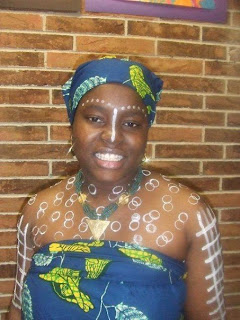
There’s a company, Berlin Investments Limited, that manufacturers and distributes a line of cosmetics named Black's Secret Make-up products in Ghana. It started selling its products and has grown in popularity so the management decided to expand. This led to the decision to open up a make-up bar in Osu, a high-time shopping area in Accra, the capital of Ghana. Ghana’s economy is growing pretty steady right now and one sector that is seeing exponential growth is the movie/music/entertainment industry. Its becoming more and more westernized with celebrities creating their own Ghanaian hybrid pop culture so this really doesn’t come as a shock to me. Women will feel like they should look like what they see on tv and in the movies (just like they do here in the United States) so they’ll want to get all the works done to make it happen. What interests me is the reactions to this article on the Ghanaweb.com website.
The men don’t want it!!! The guys that commented on the article are so appalled at the fact that the make-up line offers sun screen and melanin protection that they just had to scream out.
And I must confess that I’m enjoying reading the comments. Why? Because traditionally Ghanaians (or should I Africans in general) don’t wear make-up. Its not a part of our culture. What we would put on our faces to beautify ourselves looks nothing like what L’oreal and CoverGirl put on the shelves. (An example can be seen in this picture of myself dressed in traditional wear for a performance at an African cultural show.)
When a woman puts on foundation, blush, mascara and lipstick, they’re seen as being artificial and fake. I know many men that totally look down on it including my own father. One person commented that “they are destroying our women.” That is really how someone feels. Another person commented that “My beautiful Black Woman is natural ... No makeup.”
Interestingly enough a day after reading this article I came across another one that talked about African women and their hair.
In this article a guy talks about his mom and how he never really saw her real hair ever because she always wore wigs. To him he had no clue why she did that thinks she would look just fine with her natural regular hair. Meaning her nappy bushy unpermed hair. (See exhibit two…. My hair). He brought this up after seeing the film/documentary by Chris Rock called Good Hair. Please go see it if you haven’t. Its extremely informative and hilarious at the same time. It will show you what black women really go through to look the way they look and how much it costs them (both financially and health-wise). So he says girls shouldn’t throw chemicals in their hair and make themselves sick in the name of having their hair straight and just leave it the way it is. Then he asks other guys to comment on what they think of his opinion. He got 88 comments and I might be adding one myself. After all, what makes you beautiful is what is on the inside, not the outside.
Togo Gets its First Female Presidential Candidate
I’m proud of our Togolese neighbors. This doesn’t happen very often in African countries. They have a woman running for president. Or should I say they had. She just dropped out of the competition. Why you wonder? It looks like her and two other candidates fear that the elections will be rigged to favor the incumbent president so they are dropping out in protest. The current president just so happens to be the son of the president before him and that one ruled for three decades. After his daddy’s death, he ran for president and rigged the election to make sure he continued the ‘family legacy.’ Obviously he has no intentions of letting go anytime soon.
But let’s get back to this lady president aspirant. I’m loving her story. She has been advocating for women in Togo for the longest and wasn’t just running up against the incumbent president but against a total of 6 men. Now that is impressive. She has her doctorate in law and holds positions such as the sub-regional coordinator of the NGO Femmes, droit et développement en Afrique (Women, Law and Development in Africa (WiLDAF) and an advisor to the African Women Development Fund (AWDF).
I think its unfortunate that she has been forced to step out of the race especially since she had the approval of so many. As the combined opposition was looking to select a single candidate who would encompass their main objectives into one force against the current government, she looked like a great choice. She had the experience of serving in the countries government for many years already and advocating for women’s rights. With women constituting 52% of the country’s population, I believe it would be a long-awaited breath of fresh air for the country.
Although others oppose her running and feel that she would be run over by the numerous male candidates plus the looming male majority in the existing government, I believe that those are just the conditions that would prove to the world that Togo is not only embracing democracy and equal rights but is also willing to put the past behind them and move towards their development as a nation.
But let’s get back to this lady president aspirant. I’m loving her story. She has been advocating for women in Togo for the longest and wasn’t just running up against the incumbent president but against a total of 6 men. Now that is impressive. She has her doctorate in law and holds positions such as the sub-regional coordinator of the NGO Femmes, droit et développement en Afrique (Women, Law and Development in Africa (WiLDAF) and an advisor to the African Women Development Fund (AWDF).
I think its unfortunate that she has been forced to step out of the race especially since she had the approval of so many. As the combined opposition was looking to select a single candidate who would encompass their main objectives into one force against the current government, she looked like a great choice. She had the experience of serving in the countries government for many years already and advocating for women’s rights. With women constituting 52% of the country’s population, I believe it would be a long-awaited breath of fresh air for the country.
Although others oppose her running and feel that she would be run over by the numerous male candidates plus the looming male majority in the existing government, I believe that those are just the conditions that would prove to the world that Togo is not only embracing democracy and equal rights but is also willing to put the past behind them and move towards their development as a nation.
Ghana's got oil.... now what? [A brief progress report]
Ghana recently (relatively) discovered that it has oil fields off its shore and has since then been preparing to start drilling for a major boost to its economy (hopefully). There has been a lot of buzz about it since it happened. There have been countries all over showing interest in the oil since then (including our former colonizer, Britain as well as China) and companies bidding to be in control of the whole set-up process. Right now it looks like they are getting those formalities worked out. Norway is collaborating on oil and gas management efforts. It is offering its experience in helping over 22 countries in order to make sure international standards and laws are applied as the industry develops.
The World Bank/Afro Global Alliance is mobilizing the locals of the Jomoro District in Western Region (the coastal community that the oil discovery will be affecting the most) to discuss the benefits of the people and to find ways or preventing oil-driven conflicts as seen in other African areas such as the Niger Delta and Angola. These areas have endured many environmental hazards that have been neglected and not benefited from the immense wealth being pumped around them. Some lack basic amenities such as clean drinking water and are exposed to human rights violations.
It is for this reason that the influential players in the affairs of this community such as chiefs, opinion leaders, youth groups, heads of departments and district assembly representatives have been gathered. We must learn from the mistakes of others and build our wealth with the right foundation.
So now the people and professionals of the land have to be trained on exactly how to handle what is coming at them. For this reason a three-day workshop was held at the University of Science and Technology in Kumasi in the Ashanti region to educate engineers and stakeholders in the gas and oil industry. They are doing all they can to beef up the oil and gas technical know-how of local Ghanaians and hope that the infrastructure set-up to support the new oil industry will not only create many jobs but also cater to other industries that are the current backbone of Ghana’s economy such as agriculture and the growing private sector. Hopefully with all this education flying around measures will also be taken to prevent any environmental degradation and employ the technicians being trained to maintain the efficiency of the system.
But amid all of this there are already rumors of foul play with the initial company transactions involving close affiliates of the recently ousted government. The Texas oil company Kosmos was the company that provided the financial input and technical expertise that resulted in the discovery of Ghana’s oil in the West Cape Three Points block. It was able to establish a relationship with the Ghanaian Ministry of Energy (MOE) and the Ghana National Petroleum Corporation (GNPC) for this permission through a company called the EO Group. This company was established by two U. S. based Ghanaians that decided to invest into exploring the coastal waters of their country and ended up getting way more than they expected.
Now that the oil field discovery has been made and all Ghanaians are excited about the prospects involved, the originators of this good news are being accused of corruption. The owners of the EO Group are said to be friends of former president of Ghana, Mr. John Kuffour and are accused of using their access to top Ghana officials (at the time) to ensure that EO Group and Kosmos had the most favorable terms in the agreement. The Ghana attorney-general as well as the US Justice Department is investigating further into the transactions of the two companies and rumors are flying everywhere of what the real truth is.
This oil is a pivotal discovery for Ghana and I hope that it was not founded on fraudulent terms. These are the kinds of things Ghanaians seek to avoid. Being a country that has been applauded on its transition into a growing democracy on a continent known for continuous chaos, many international eyes are observing how Ghana will handle its newly found wealth. U. S. President Barack Obama chose Ghana to be the first African country to visit with his family after winning the presidency.
Ghanaians all over the world bragged to nationals of other African countries that we were the first because we’re such a ‘good example’ for others to follow but stories like this could throw all of that down the sink.
Oil means money and money means people breaking all kinds of rules. I hope Ghana cleans it up and keeps it clean. We have a reputation to protect. The best way to keep things transparent is to educate as many as possible to ensure accountability of all parties. I believe we’re stepping in the right direction.
The World Bank/Afro Global Alliance is mobilizing the locals of the Jomoro District in Western Region (the coastal community that the oil discovery will be affecting the most) to discuss the benefits of the people and to find ways or preventing oil-driven conflicts as seen in other African areas such as the Niger Delta and Angola. These areas have endured many environmental hazards that have been neglected and not benefited from the immense wealth being pumped around them. Some lack basic amenities such as clean drinking water and are exposed to human rights violations.
It is for this reason that the influential players in the affairs of this community such as chiefs, opinion leaders, youth groups, heads of departments and district assembly representatives have been gathered. We must learn from the mistakes of others and build our wealth with the right foundation.
So now the people and professionals of the land have to be trained on exactly how to handle what is coming at them. For this reason a three-day workshop was held at the University of Science and Technology in Kumasi in the Ashanti region to educate engineers and stakeholders in the gas and oil industry. They are doing all they can to beef up the oil and gas technical know-how of local Ghanaians and hope that the infrastructure set-up to support the new oil industry will not only create many jobs but also cater to other industries that are the current backbone of Ghana’s economy such as agriculture and the growing private sector. Hopefully with all this education flying around measures will also be taken to prevent any environmental degradation and employ the technicians being trained to maintain the efficiency of the system.
But amid all of this there are already rumors of foul play with the initial company transactions involving close affiliates of the recently ousted government. The Texas oil company Kosmos was the company that provided the financial input and technical expertise that resulted in the discovery of Ghana’s oil in the West Cape Three Points block. It was able to establish a relationship with the Ghanaian Ministry of Energy (MOE) and the Ghana National Petroleum Corporation (GNPC) for this permission through a company called the EO Group. This company was established by two U. S. based Ghanaians that decided to invest into exploring the coastal waters of their country and ended up getting way more than they expected.
Now that the oil field discovery has been made and all Ghanaians are excited about the prospects involved, the originators of this good news are being accused of corruption. The owners of the EO Group are said to be friends of former president of Ghana, Mr. John Kuffour and are accused of using their access to top Ghana officials (at the time) to ensure that EO Group and Kosmos had the most favorable terms in the agreement. The Ghana attorney-general as well as the US Justice Department is investigating further into the transactions of the two companies and rumors are flying everywhere of what the real truth is.
This oil is a pivotal discovery for Ghana and I hope that it was not founded on fraudulent terms. These are the kinds of things Ghanaians seek to avoid. Being a country that has been applauded on its transition into a growing democracy on a continent known for continuous chaos, many international eyes are observing how Ghana will handle its newly found wealth. U. S. President Barack Obama chose Ghana to be the first African country to visit with his family after winning the presidency.
Ghanaians all over the world bragged to nationals of other African countries that we were the first because we’re such a ‘good example’ for others to follow but stories like this could throw all of that down the sink.
Oil means money and money means people breaking all kinds of rules. I hope Ghana cleans it up and keeps it clean. We have a reputation to protect. The best way to keep things transparent is to educate as many as possible to ensure accountability of all parties. I believe we’re stepping in the right direction.
Thursday, February 4, 2010
A long way come but still a long way to go
On a scale of African counterparts, Ghana has come far.
In 1957, it was the first sub-Saharan country to gain its independence. Since then, it can boast that it has not had a war. The majority of African countries familiar to most Americans became so due to a war or famine (such as Ethiopia, Rwanda and Sudan). This is largely due to the fact that before colonization, Africa was divided based on ethnic and language groups (just like in Europe, Germans live in Germany and French live in France). During the Scramble for Africa, marked by the Berlin Conference, many ethnic groups were divided into colonies and territories based on the desire of European powers that did not take the location of various ethnic groups into consideration. This has resulted in many ethnicities being forced to live together as nations after struggling for independence from their colonial masters.
For this reason, Ghana (formerly the British Gold Coast Colony) is comprised of approximately 100 ethnic groups. Yes, Ghana has had its share of military coup d’etats and corruption has not been eradicated but never has it had a war. As the country has progressed throughout the years, its democracy has become an example to many and has been dubbed the “island of peace” in a very chaotic Africa. Many believe this is the reason that it was the first African country Barack Obama chose to visit after he became president.
Ghana has become a center for business and tourism in Africa. It has seen a phenomenal boost in its music and film industry with the emergence of ‘hip-life,’ the Ghanaian version of hip-hop and ‘Ghollywood.’ Improvements to the educational system are ever-progressing and many come from countries all over Africa to its universities. At independence there was just one university but there are now 5 public universities and the establishment of many private universities. There has been expansion in almost every part of the public and private sectors from mining (Ghana has an extensive Gold mining industry) to health to the fashion industry and of course, agriculture, its main revenue source. Ghana is currently the second largest exporter of cocoa in the world.
All these are achievements Ghanaians boast of daily but there is much more to be done. There are still many that live without electricity, running water and many amenities such as schools and hospitals. There is also a technological breach between the have’s and the have-not’s that is similar to the digital divide the US previously experienced. Internet access is open and available in urban centers but scarce in rural regions. Many visit cafes and in-house internet connections are still not a widespread phenomenon. This shows that Ghana still has a long way to go but is steadily on the path to getting there.
In 1957, it was the first sub-Saharan country to gain its independence. Since then, it can boast that it has not had a war. The majority of African countries familiar to most Americans became so due to a war or famine (such as Ethiopia, Rwanda and Sudan). This is largely due to the fact that before colonization, Africa was divided based on ethnic and language groups (just like in Europe, Germans live in Germany and French live in France). During the Scramble for Africa, marked by the Berlin Conference, many ethnic groups were divided into colonies and territories based on the desire of European powers that did not take the location of various ethnic groups into consideration. This has resulted in many ethnicities being forced to live together as nations after struggling for independence from their colonial masters.
For this reason, Ghana (formerly the British Gold Coast Colony) is comprised of approximately 100 ethnic groups. Yes, Ghana has had its share of military coup d’etats and corruption has not been eradicated but never has it had a war. As the country has progressed throughout the years, its democracy has become an example to many and has been dubbed the “island of peace” in a very chaotic Africa. Many believe this is the reason that it was the first African country Barack Obama chose to visit after he became president.
Ghana has become a center for business and tourism in Africa. It has seen a phenomenal boost in its music and film industry with the emergence of ‘hip-life,’ the Ghanaian version of hip-hop and ‘Ghollywood.’ Improvements to the educational system are ever-progressing and many come from countries all over Africa to its universities. At independence there was just one university but there are now 5 public universities and the establishment of many private universities. There has been expansion in almost every part of the public and private sectors from mining (Ghana has an extensive Gold mining industry) to health to the fashion industry and of course, agriculture, its main revenue source. Ghana is currently the second largest exporter of cocoa in the world.
All these are achievements Ghanaians boast of daily but there is much more to be done. There are still many that live without electricity, running water and many amenities such as schools and hospitals. There is also a technological breach between the have’s and the have-not’s that is similar to the digital divide the US previously experienced. Internet access is open and available in urban centers but scarce in rural regions. Many visit cafes and in-house internet connections are still not a widespread phenomenon. This shows that Ghana still has a long way to go but is steadily on the path to getting there.
Tuesday, February 2, 2010
Introduction
When many Americans think of Africa, they think of the images that have been pushed by mainstream media. Starving children, poverty, war, disease…… a continent that just seems to never be able to get its act together and always needs to be relieved. And yes, Africa has had its ups and downs. Corrupt governments, ethnic clashes and some of the harshest living conditions have prevailed in several countries. Many of these situations are the remnants of colonization by the ever-exploitative, resource raping European powers that left begrudgingly (but that’s another blog for another day).
In the minds of many, the idea still prevails that most Africans live without electricity, pipe-borne water or a balanced diet, talk less of internet, cell phones and video games. As a Ghanaian born in America and raised in both countries, I am a witness to the very opposite. Especially within the last 5 or 6 years, Africa has seen a surge in technology that could be putting it in the same ranks as countries like India and China sooner than many would expect. There is more going on behind the scenes than mainstream media is willing to reveal.
I am here to introduce to you the Africa they never show you. The Africa that is doing more than just pulling itself up by the bootstraps. The Africa that has just as many facebookers as anywhere else. The Africa that has city-dwellers averaging two cell phones a person. As a Ghanaian, I will be focusing particularly in that region but will also incorporate other stories from within the West African region. I will focus on the development and adaptation of technology in the life of the Ghanaian. This blog will touch on all aspects from health to social networking to education to music and entertainment. It will attempt, to the best of its ability, to demonstrate how a country that has become a prime example of an African democracy is adapting western technologies as well as developing technologies of its own to bring itself to a global parallel. It will reflect the stories found on Ghanaian owned and run websites such as GhanaWeb.com, GhanaBusinessNews.com, GhanaMusic.com, GhanaThink.com, GhanaShowbiz.com and others.
Please keep in mind that this blog is being created for a class that I am taking at the University of Maryland- College Park (JOUR 289I) but is free to be viewed by all and welcomes as many comments as possible. Any sources that you might run into as a reader that you think might be relevant to the topic should please be forwarded to the author. Thank you and happy reading!
In the minds of many, the idea still prevails that most Africans live without electricity, pipe-borne water or a balanced diet, talk less of internet, cell phones and video games. As a Ghanaian born in America and raised in both countries, I am a witness to the very opposite. Especially within the last 5 or 6 years, Africa has seen a surge in technology that could be putting it in the same ranks as countries like India and China sooner than many would expect. There is more going on behind the scenes than mainstream media is willing to reveal.
I am here to introduce to you the Africa they never show you. The Africa that is doing more than just pulling itself up by the bootstraps. The Africa that has just as many facebookers as anywhere else. The Africa that has city-dwellers averaging two cell phones a person. As a Ghanaian, I will be focusing particularly in that region but will also incorporate other stories from within the West African region. I will focus on the development and adaptation of technology in the life of the Ghanaian. This blog will touch on all aspects from health to social networking to education to music and entertainment. It will attempt, to the best of its ability, to demonstrate how a country that has become a prime example of an African democracy is adapting western technologies as well as developing technologies of its own to bring itself to a global parallel. It will reflect the stories found on Ghanaian owned and run websites such as GhanaWeb.com, GhanaBusinessNews.com, GhanaMusic.com, GhanaThink.com, GhanaShowbiz.com and others.
Please keep in mind that this blog is being created for a class that I am taking at the University of Maryland- College Park (JOUR 289I) but is free to be viewed by all and welcomes as many comments as possible. Any sources that you might run into as a reader that you think might be relevant to the topic should please be forwarded to the author. Thank you and happy reading!
Subscribe to:
Posts (Atom)
